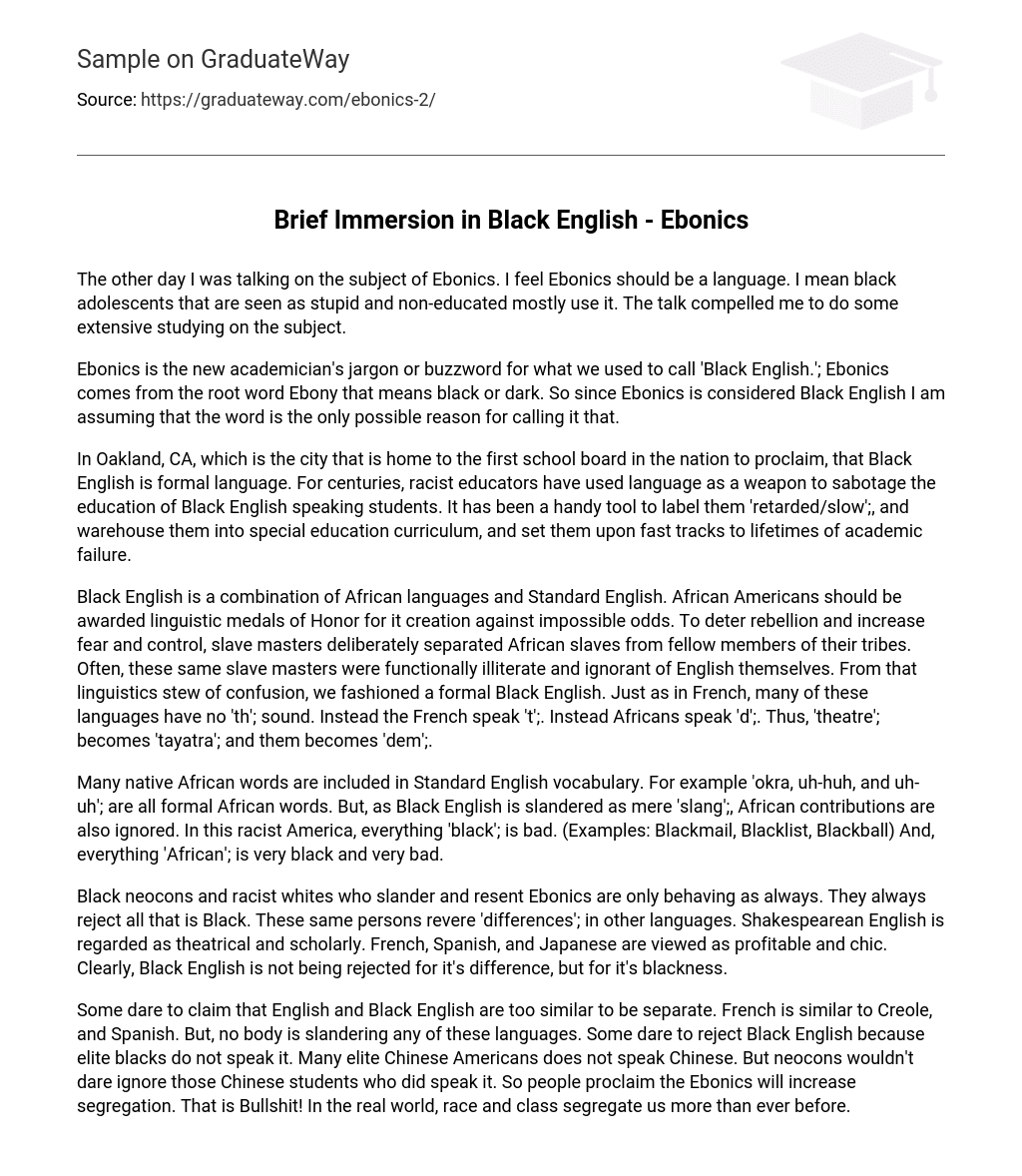Recently, I had a conversation about the subject of Ebonics and shared my viewpoint that it should be recognized as a language. Ebonics is often linked to Black teenagers who are unfairly seen as unintelligent and uneducated. This sparked my interest and led me to conduct extensive research on the topic.
Ebonics, which is also known as Black English, refers to a dialect connected to the African American community. The term “Ebonics” originates from the word “Ebony,” signifying black or dark. As Ebonics is essentially equivalent to Black English, it can be understood that the word itself serves as its main justification for being labeled as such.
In Oakland, CA, the first school board in the nation declared that Black English is a formal language. Throughout history, racist educators have used language as a means to hinder the education of students who speak Black English. This has allowed them to unjustly classify these students as ‘retarded/slow’, place them in special education programs, and condemn them to a lifetime of academic failure.
Black English is a blend of African languages and Standard English. Despite the difficult circumstances, African Americans should be recognized and honored for creating this unique language. Slave masters intentionally separated African slaves from their tribes in order to prevent rebellion and maintain control. It is noteworthy that these slave masters themselves were often illiterate and had little knowledge of English. Out of this linguistic confusion, Black English emerged as a formal language. Similar to French, many African languages do not have the “th” sound, replacing it with a “t”. For example, “theatre” becomes “tayatra” and “them” becomes “dem”.
Many African words are incorporated into Standard English vocabulary, such as ‘okra’, ‘uh-huh’, and ‘uh-uh’. However, while Black English is often derogatorily labeled as mere ‘slang’, the African contributions are disregarded. In an America permeated with racism, anything associated with ‘black’ is deemed negative, as illustrated by words like ‘Blackmail’, ‘Blacklist’, and ‘Blackball’. Similarly, anything associated with ‘African’ is automatically associated with darkness and negativity.
Black neocons and racist whites consistently dismiss and criticize Ebonics, reflecting their typical attitude towards anything related to Black culture. Notably, they show admiration and respect for “differences” in other languages. Shakespearean English is considered dramatic and intellectual, while French, Spanish, and Japanese are seen as advantageous and fashionable. This clearly indicates that Black English is rejected not just because it is different but also because it is associated with blackness.
Some argue against recognizing English and Black English as separate languages, citing the similarities between French and Creole, as well as Spanish. However, these languages do not face criticism for their differences. The rejection of Black English is often based on the belief that it is not spoken by influential members of the black community. Yet, many elite Chinese Americans also do not speak Chinese, yet they are not dismissed by neoconservatives. The idea that Ebonics would lead to segregation has no basis in reality. In truth, it is race and social class that continue to divide us.
Students who speak Black English are unfairly required to decode and translate simultaneously and automatically. Similar to other linguistic instruction, Ebonics is utilized as a bridge to assist black students in mastering English, an essential skill for success in a world where Standard English governs all domains. It is completely ridiculous, like all racist fears.
Our cultural differences are significant, and it is crucial that students do not suffer from academic abuse as a result of these differences. Ebonics, as an academic discipline, will triumph and play a pivotal role in empowering Black students intellectually. Let us closely observe the progress of Black students, as I predict we will witness a sudden and dramatic increase in the number of Black honors students and graduates. Furthermore, we can anticipate a significant reduction in the labeling of Black students as intellectually disabled, fewer instances of suspension, and a decrease in drop-out rates.
Reference
- Page for Info:People Magazine; March 18-25 1996
- Webster’s English to French ; French to English Dictionary
- A television show entitled: ‘Ebonics, the forgotten language’;





